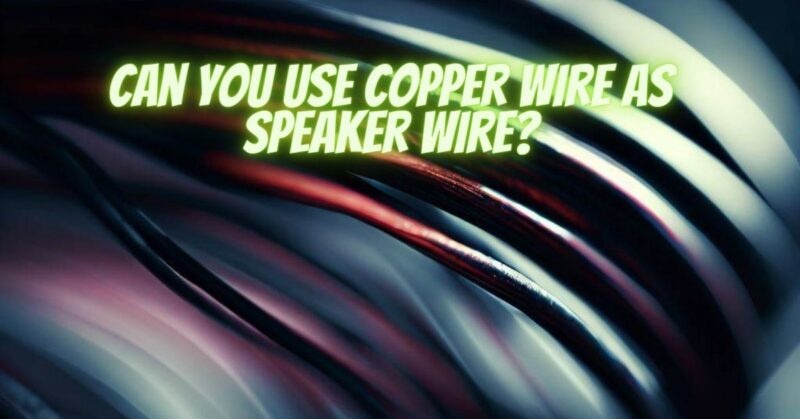When it comes to speaker connections, the choice of wire plays a crucial role in achieving optimal audio performance. Copper wire is a popular and widely used option due to its excellent electrical conductivity properties. In this article, we will explore the use of copper wire as speaker wire and discuss its advantages, considerations, and best practices.
- Conductivity and Signal Transmission: Copper is highly conductive, making it an ideal material for transmitting audio signals. It has low resistance, allowing for efficient power transfer from the amplifier to the speakers. Copper wire provides minimal signal loss, ensuring that the audio signal remains intact and faithful to the original source. This property makes copper wire suitable for speaker connections, allowing for clear and accurate audio reproduction.
- Gauge Selection: The gauge or thickness of the copper wire is an important consideration. Thicker gauges, such as 14 or 16 AWG (American Wire Gauge), are commonly used for longer cable runs or higher-powered systems. Thinner gauges, like 18 or 20 AWG, are suitable for shorter distances or lower-powered setups. The gauge selection depends on the specific requirements of your speakers and amplifier, ensuring sufficient power handling capabilities and minimizing resistance.
- Insulation and Durability: Copper wire used as speaker wire is typically insulated to prevent short circuits and ensure electrical safety. Insulation materials such as PVC (Polyvinyl Chloride) or Teflon provide protection and reduce the risk of accidental contact with other conductive materials. Additionally, the durability of the insulation ensures longevity and reliability of the speaker wire, safeguarding against wear and damage.
- Proper Terminations: To connect copper wire to speakers and amplifiers, proper terminations are essential. Options include banana plugs, spade connectors, or bare wire connections, depending on the specific connectors available on your equipment. It is important to ensure secure and reliable connections to minimize the risk of signal loss or intermittent connections.
- Best Practices: When using copper wire as speaker wire, there are a few best practices to keep in mind. Avoid sharp bends or kinks in the wire, as this can affect signal transmission. Ensure proper stripping of the wire to expose the right amount of conductor for connection. Use appropriate strain relief or cable management techniques to prevent stress on the wire and maintain its integrity.
Conclusion:
Copper wire is a reliable and widely used option for speaker connections due to its excellent conductivity properties. When properly selected and terminated, copper wire can effectively transmit audio signals, allowing for clear and accurate sound reproduction. Whether you are setting up a basic stereo system or a sophisticated home theater, using high-quality copper wire in the appropriate gauge ensures optimal performance and audio fidelity. As an audio enthusiast, choosing copper wire as your speaker wire is a solid choice to enhance your listening experience.

